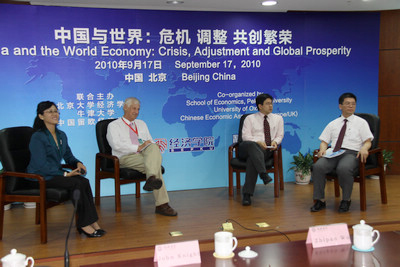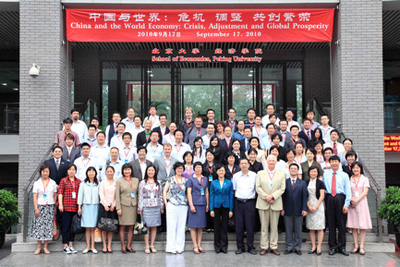Peking University, Beijing, Sept. 22, 2010: The international conference with the theme of “China and the World Economy: Crisis, Adjustment and Mutual Prosperity” was held successfully in School of Economics, Peking University (PKU), from September 16 to 17. With the attendance of more than 200 experts and scholars from UK, US, German, France, Italy and other countries, the conference was co-hosted by PKU School of Economics, Oxford University, and Chinese Economic Association (Europe/UK).
Doctor Dong Zhiyong, Vice Dean of PKU School of Economics, presided over the opening ceremony, where Prof. Wu Zhipan, Executive Vice President of PKU, Prof. Sun Qixiang, Dean of PKU School of Economics and President of the Conference Committee, and Prof. Fu Xiaolan from Oxford University, gave welcoming speeches respectively.

International Conference of “China and the World Economy: Crisis, Adjustment and Mutual Prosperity” was Held in School of Economics, PKU
Prof. Sun Qixiang pointed out in her welcoming speech that the conference would focus on discussions over the global financial crisis’s impact upon China, reactions of central, local governments, as well as enterprises in China, and the influence of those measures on global economy and future prosperity. Specifically, she stressed that China has played an important role in defending crisis of this time obviously as a fast-developing economic power, and was widely appreciated for those quick and powerful responding measures, such as Economic Stimulus and Monetary Expansion, taken by the Chinese government. Therefor, China would be highly expected to play a steady role in future world economy judging from the promoting role it well performed before. Besides, she introduced that PKU School of Economics, as the oldest department of Economics in China, has always thought of benefiting the people, finding out economic mechanisms, and contributing to the development of society and people’s warfare. Under the urgency of the global financial crisis, it is the responsibility of everyone in the School of Economics to think wisely, creatively, and independently to find out the antidote and lead the world to prosperity.
After the opening ceremony, five scholars delivered keynote speeches on Chinese and global economy in two periods. Prof. Sun presided the first period, during which Prof. John Knight from Oxford University discussed the problem of structural imbalance in current Chinese economy that was characterized by tremendous trade surplus, over-high proportion of investment, and over-low consumption ratio, and pointed out that the adjustment of economic imbalance concerns with the sustainable development of future Chinese economy as well. After that, Prof. Albert Park also from Oxford University addressed under the title “Global Financial Crisis, Labor Regulations, and Employment Challenge that China Faces”. By the presentation of the latest data, he suggested that financial crisis would only have short influence over Chinese employment condition; generally speaking, China cities’ short of labor, workers’ salary rising, the revised Labor Law would somehow raise the cost of labor in China, but it was uncertain if the revised Labor Law would have further influence over Chinese economy in the long run. Prof. Zheng Jinghai, Goteborg University, Sweden, analyzed the driving force for the increase of Chinese economy from aspects of investment, structure, and TFP under the title of “China’s Growth Potential”, believing in the future maintenance of rapid economic growth in China.
The second period was presided over by Prof. Fu Xiaolan. Under the title of “China’s Practice against Financial Crisis”, Prof. Jia Kang, Director of Research Institute for Fiscal Science, Ministry of Finance, discussed the Chinese government’s practice to fight against this financial crisis and the related accomplishment. By detail data, he proved the Chinese government’s efficiency in monetary and fiscal policies in various aspects. Finally, Prof. Lin Hanlin, Chair of Department of Public Finance, PKU School of Economics, gave a lecture on “Tax Reform in China: Challenge and Options”, where he indicated that Chinese current tax system was growth-oriented rather than equity-oriented, on account of which income redistribution had not been well regulated. The enterprises’ taxes were heavy at the same time. Based on those analyses, he put forward the direction for future tax reform in China.
On the afternoon of September 17, the attendees had group discussions on six themes in five sub-group meeting halls separately. The themes were “Foreign Direct Investment and Multinational”, “Environment, Energy, and Sustainable Development”, “Corporate Governance and Strategy”, “Income Distribution and Warfare”, “Financial Crisis and Regulations”, and “Macro-economy and Real Estate Market”. During group discussions, 40 scholars from more than ten countries and areas read their papers and communicated with the audiences.

Group photo of the attended scholars
Three years after the breakout of the Subprime Mortgage Crisis, this conference reconsidered the crisis and Chinese economy’s performance in depth. Scholars discussed how the world economy would change to achieve enduring and sustainable global fiscal prosperity after the crisis. Those thoughts are doubtlessly beneficial for people to understand the world economy and to recognize China economy’s direction in future.
Translated by: ZHAO Ning
Edited by: Su Juan
Source: PKU News (Chinese)